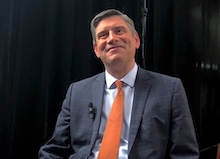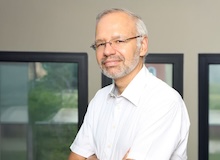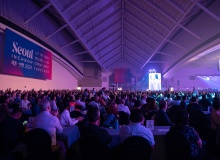


AI should help us address ways to collaborate with communities to facilitate spiritual transformation, growth in Christ, and help the emerging church grow and mature.
.jpg)
I'm excited by how helpful and efficient Ai tools are. Yet they work best when used by someone already shaped by years of training, when one’s skills and relationship with the Bible are essentially in place.
.jpg)
As young adults navigate a world of metrics, self-optimisation and spiritual openness, we must consider how we can disciple this generation and point them to Jesus rather than self-improvement.

Artificial Intelligence is not a panacea, but its potential to transform the lives of children with additional needs is undeniable.

Will Graham, grandson of the well-known 20th-century evangelist, reflects on the challenges of technology and shares his experiences in evangelism.

In his latest book, an award-winning cardiologist with a long career critically questions the prevailing thinking in the Western world on 15 fundamental issues. Interview with Manuel Martínez-Sellés.

The National Library of Spain opens a new exhibition explaining the importance of the manuscript, written in Greek possibly in the 3rd century.

Headlines the world over last Friday announced the new pope, Leo XIV. Headlines 75 years ago on May 10, 1950, announced a new audacious plan for peace: ‘France takes the nations by surprise’, ‘Schuman bomb’.
.jpg)
A report from the European Freedom Network Bridge 2025 Conference held in Austria.

I recommend the Seoul Statement to a wide readership, It presents in a concise way an approach to mission that has the potential to bring together theologians and practitioners.

The focus of the L4 Seoul Statement is not on dividing issues like the exact limitation of biblical inerrancy but rather about how we read the Scriptures.

Jesus talked of wheat and tares growing up together. Here is a random sample of both in the last 25 years.

If we are open to hear the voice of the global Church, to receive its help, and to serve it; then Europe still has a key part to play in the evangelisation of the earth.
Cropped.jpg)
The start of the academic year in Europe has brought out the differences between those who ban mobile phones and those who opt to manage technology in the classroom. Dámaris García, a psychologist working with young people, explains her point of view.
.jpg)
I came from the future because in Seoul at L4, I had the opportunity to connect with issues of relevance for the coming years of the Global Church.

Several people were arrested after an American woman died in the so called ‘Sarco’ capsule. The Swiss interior minister says it is not legally compliant.
.jpg)
While AI does not pose an existential threat to humanity, we must be aware of the concerning ways it is shaping our understandings of God, ourselves, and the world around us.
.jpg)
About 250 people attended the IFED conference in Padova. Tim Challies addressed the interaction of the Gospel and new communication technologies. ‘Evangelical Focus’ was one of the media projects presented.
.jpg)
The EU passes a groundbreaking “Artificial Intelligence Act”. It bans ‘social scoring’, emotional recognition at the workplace, and “deceptive techniques that distort behaviour”.
.jpg)
Charlie Catlett, an experienced computer scientist who explains Artificial Intelligence to non-experts, speaks to Evangelical Focus. “Chatbots are non-persons, and you shouldn’t be having a personal relationship with a non-person”.
.jpg)
Computer scientist Charlie Catlett comments on the cascade of new technologies coming to our mobile devices. “Those who will implement the best applications of AI are now probably in high school”.

Be aware of the role of artificial intelligence in elections, especially in your social media timeline. Truth and trust should go hand in hand.
.jpg)
Half check the website of their local church on a regular basis and 24% follow Christian influencers, finds a study.

Jazz Cow “reluctantly leads a group of artists, poets and misfits in resisting Dr Popp’s technocratic world of algorithms and fake filters”. Creator John Lumgair hopes to deliver a thoughtful social satire “with a big heart”.

“This scepticism should encourage churches to evaluate Artificial Intelligence carefully and responsibly”, conclude the authors of a survey in the US.

Las opiniones vertidas por nuestros colaboradores se realizan a nivel personal, pudiendo coincidir o no con la postura de la dirección de Protestante Digital.